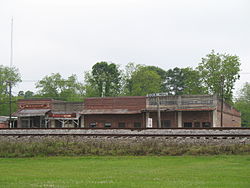Duck Hill, Mississippi
| Duck Hill, Mississippi | |
|---|---|
| Town | |

Duck Hill from across the tracks
|
|
| Motto: The place called home | |
 Duck Hill, Mississippi is highlighted in the small red zone. |
|
| Location in the United States | |
| Coordinates: 33°37′55″N 89°42′53″W / 33.63194°N 89.71472°WCoordinates: 33°37′55″N 89°42′53″W / 33.63194°N 89.71472°W | |
| Country | United States |
| State | Mississippi |
| County | Montgomery |
| Government | |
| • Type | Mayor-Counsel |
| Area | |
| • Total | 1.0 sq mi (2.7 km2) |
| • Land | 1.0 sq mi (2.7 km2) |
| • Water | 0.0 sq mi (0.0 km2) |
| Elevation | 253 ft (77 m) |
| Population (2010) | |
| • Total | 732 |
| • Density | 720.8/sq mi (278.3/km2) |
| Time zone | Central (CST) (UTC-6) |
| • Summer (DST) | CDT (UTC-5) |
| ZIP code | 38925 |
| Area code(s) | 662 |
| FIPS code | 28-20260 |
| GNIS feature ID | 0669470 |
Duck Hill is a town in Montgomery County, Mississippi. The population was 732 at the 2010 census.
Duck Hill is located on U.S. Route 51, midway between Grenada and Winona. Big Bogue Creek flows east of the town.
The annual Grassroots Blues Festival takes place each July in Duck Hill.
Duck Hill is named for a large hill northeast of the town, where "Duck", a Choctaw chief, held war councils. Chief Duck was also a medicine man or shaman who treated his people. A statue of Chief Duck is located on U.S. Route 51 in Duck Hill, next to an old Illinois Central caboose.
The first European-American settler in the area was John A. Binford in 1834. He built the first home in the area, and developed his property as a cotton plantation. He became one of the region's most successful planters and large slaveholders. Binford was elected to the Mississippi Legislature. Duck Hill was a trading center for the cotton planters.
During the Civil War, Binford's sons, James R. and John A. Jr., helped lead the Confederate "Company E" from Duck Hill, known as the "McClung Rifles". James R. Binford later was elected to the Mississippi State Senate, where after the Reconstruction era, he wrote the Jim Crow laws for Mississippi.
In 1856 the Illinois Central Railroad completed a line from Chicago to New Orleans, and it built a depot at Duck Hill. This stimulated its businesses. Premier passenger trains such as the City of New Orleans and the Panama Limited once passed through the town. The line is now used for freight operation by the Grenada Railway.
...
Wikipedia

